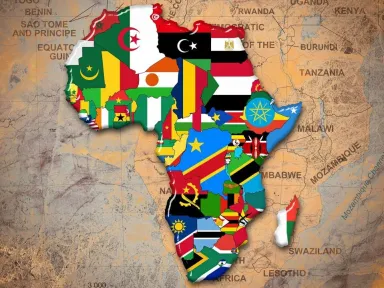Africa is a land of opportunity when it comes to investment. With a population of over 1.4 billion people and a rapidly growing middle class, the continent presents an attractive market for businesses looking to expand their reach. However, investing in Africa is not without its challenges. From political instability and corruption to a lack of infrastructure and a skilled workforce, there are many factors to consider when choosing which African country to invest in.
Why invest in Africa?
Africa has been gaining attention as an investment destination for a variety of industries. The continent’s population is projected to double to 2.4 billion by 2050, with a growing middle class and increasing urbanization. With its abundance of natural resources, Africa is home to some of the world’s fastest-growing economies, offering investors a wide range of opportunities.
Another reason to invest in Africa is the favorable investment climate, with many governments implementing reforms to improve business-friendly policies and regulations. These reforms have resulted in increased Foreign Direct Investment (FDI) and economic growth in many African countries.
However, investing in Africa also comes with its challenges. Political instability, corruption, and inadequate infrastructure are some of the challenges investors may face. Despite these challenges, many investors see Africa as a region of great potential and are willing to take the risk.
In this blog post, we will explore the top African countries to invest in, their opportunities, and challenges. We will provide an overview of each country’s economy, investment climate, and emerging industries. Whether you are a seasoned investor or just getting started, this guide will give you an insight into Africa’s investment landscape and help you make informed investment decisions.
Overview of the African economic landscape and its potential
Africa is a continent with huge potential for economic growth and has seen significant progress in recent years. The African economy is projected to grow at a rate of 3.4 percent in 2021, compared to the global average of 2.9 percent, according to the World Bank. This growth is primarily driven by the continent’s expanding middle class, abundant natural resources, and advances in technology.
In addition, many African countries have implemented economic reforms, created business-friendly environments, and attracted foreign investment. With a young and growing population, there is a large consumer market with increasing purchasing power. This presents vast opportunities for investment in various sectors such as agriculture, infrastructure, energy, and manufacturing.
However, it is important to note that investing in Africa comes with its own set of challenges. The continent faces issues such as political instability, corruption, and inadequate infrastructure. These challenges can create barriers to entry and operational challenges for businesses.
Despite these challenges, African countries have shown resilience and continue to make strides in addressing these issues. For instance, several governments have implemented reforms to improve governance and transparency, while others have invested in infrastructure to improve connectivity and logistics.
Overall, the African economic landscape presents great potential for investment opportunities, but it is important for investors to do their due diligence and carefully assess the risks and challenges involved. With the right approach, investing in Africa can be highly rewarding and contribute to the continent’s sustainable development.
Top African countries to invest in: Opportunities and challenges
Africa is a continent that is rich with investment opportunities, but it is also important to be aware of the challenges that come with investing in these countries. Here are some of the top African countries to invest in, along with their opportunities and challenges:
1. Ghana: The new oil frontier
Ghana has recently emerged as a new oil frontier in Africa. The discovery of oil and gas reserves in the country has led to an influx of foreign investment and a surge in economic growth. The oil sector has become a major contributor to Ghana’s economy, accounting for over 6% of its GDP.
Investors looking to enter the Ghanaian oil industry can take advantage of the government’s progressive policies, which include tax incentives, streamlined regulations, and a favorable investment climate. The government has also invested heavily in infrastructure, including the development of ports and transportation networks, which has improved the ease of doing business in the country.
However, investing in Ghana’s oil industry is not without its challenges. One of the major issues faced by investors is the volatility of oil prices, which can fluctuate unpredictably and impact profitability. Additionally, the country’s reliance on oil exports leaves it vulnerable to global oil market shifts.
Another challenge is the issue of local content requirements, which mandate that a certain percentage of jobs and services in the oil sector be reserved for Ghanaian citizens and companies. This policy can be difficult to navigate for foreign investors, who may struggle to find suitable local partners or suppliers.
Despite these challenges, Ghana remains an attractive destination for investors looking to enter the African oil market. With its stable political environment, well-established legal system, and growing economy, the country offers a strong foundation for sustainable growth and development in the oil industry.
2. Kenya: A rising tech hub
When it comes to technology in Africa, Kenya is definitely a country to watch. In recent years, the country has been dubbed as the “Silicon Savannah” due to its growing tech industry. Nairobi, the capital city, is home to numerous tech startups and companies, making it a hub for innovation and creativity.
One of the reasons why Kenya has been able to establish itself as a tech hub is its favorable government policies towards the industry. The government has made significant investments in digital infrastructure such as high-speed internet connectivity and mobile phone penetration, which have played a key role in promoting the growth of the tech industry.
Kenya’s young and tech-savvy population has also played a significant role in the growth of the industry. With a median age of 19 years old, Kenya has one of the youngest populations in the world, and this demographic is driving the adoption of technology across the country.
However, despite the numerous opportunities that the tech industry presents in Kenya, there are also challenges. The lack of access to funding for startups is one such challenge. Many startups struggle to secure the necessary funding to scale their business, and this has resulted in many promising startups shutting down.
Additionally, the country faces issues such as high levels of corruption and political instability, which can affect investor confidence. Nonetheless, Kenya’s tech industry continues to grow, and with the right investments and support, it has the potential to become one of the leading tech hubs in Africa.
3. Nigeria: The largest economy in Africa
Nigeria is the largest economy in Africa and is a country with enormous potential for investors. Its population of over 200 million makes it the most populous country in Africa, presenting a huge market for businesses. Nigeria is rich in natural resources, including oil, gas, and solid minerals, making it the 12th largest producer of petroleum in the world. Nigeria also has a diversified economy with a growing technology sector, a thriving film industry, and a robust agricultural sector, providing opportunities for investment in various sectors.
However, investing in Nigeria also comes with some challenges. Corruption is a major issue in Nigeria, and this can pose a risk to businesses. Infrastructure is also a significant challenge, with poor road networks, inadequate power supply, and limited access to credit. The political environment can also be unstable, with frequent changes in government policies and regulations.
Despite these challenges, Nigeria remains an attractive destination for investment. The government has made efforts to improve the business environment, including implementing policies to promote foreign investment and economic growth. There are also incentives for investors, such as tax holidays, pioneer status, and import duty waivers.
Investing in Nigeria requires careful consideration of the risks and opportunities. The key to success is to have a good understanding of the market, the regulatory environment, and the cultural nuances. With the right approach, Nigeria can be a rewarding investment destination, offering investors the chance to tap into the potential of Africa’s most populous country and largest economy.
4. South Africa: A mature market with new opportunities
South Africa is often considered one of the most mature markets in Africa, with a well-developed infrastructure and a highly skilled workforce. The country has a diversified economy and is rich in natural resources, making it an attractive destination for investors. With a population of over 59 million people, South Africa provides a large consumer market for businesses.
Despite being a mature market, South Africa still offers plenty of new opportunities for investors. The country is undergoing a digital transformation, and there is significant growth in the technology sector, particularly in fintech and e-commerce. The country is also investing heavily in renewable energy, which is an area that is ripe for investment.
However, investing in South Africa does come with its challenges. The country is grappling with high unemployment rates and a widening income gap. There is also political instability, which can make investors nervous. Additionally, South Africa has a complex regulatory environment that can be challenging for businesses to navigate.
Despite these challenges, South Africa remains an attractive destination for investors. The country has a highly developed financial system, and it is one of the most transparent and well-regulated markets in Africa. With a wealth of opportunities available, investors who are willing to navigate the challenges can reap significant rewards.
5. Rwanda: The fastest growing economy in Africa
Rwanda, also known as the “Land of a Thousand Hills,” has been recognized as the fastest-growing economy in Africa. In recent years, the country has made significant progress in improving its business environment, increasing foreign investment, and boosting economic growth. The government’s Vision 2020 plan aims to transform Rwanda into a knowledge-based economy, driven by technology and innovation.
Rwanda has a thriving entrepreneurial ecosystem, with many startups and small businesses emerging in recent years. The government has established various initiatives to support entrepreneurship, including the Rwanda Development Board, which aims to promote investment and create jobs in the country. Additionally, the Kigali Innovation City, a technology hub, is under construction and will be an important center for innovation and research.
However, Rwanda still faces challenges such as low levels of foreign direct investment, high levels of poverty, and limited access to finance for small and medium-sized enterprises. The country is also heavily reliant on agriculture, and climate change poses a significant threat to the sector.
Despite these challenges, Rwanda has made impressive strides in boosting its economy and creating a favorable business environment. Investors who are looking for opportunities in Africa should consider Rwanda as a potential investment destination. With its young and dynamic population, strategic location, and commitment to innovation and entrepreneurship, Rwanda is well-positioned to become a major player in the African economy.
6. Ethiopia: A country of untapped potential
Ethiopia is a country of untapped potential and offers many opportunities for investors. With a population of over 110 million people, it is the second-most populous country in Africa and has a fast-growing economy. Ethiopia has a strategic location, bordering six countries and with access to ports in Djibouti, Eritrea, and Somalia, making it a hub for trade and investment.
One of the most attractive sectors for investment in Ethiopia is agriculture. The country has vast agricultural land, and the government is promoting agricultural modernization to increase productivity and exports. The coffee industry is also a major contributor to the economy, and Ethiopia is the largest coffee producer in Africa. Other sectors with investment potential include manufacturing, construction, and tourism.
However, Ethiopia also has its challenges. Infrastructure development is a key issue, with poor road networks and limited access to electricity hindering economic growth. The country also faces political instability and has experienced conflicts in some regions. Nevertheless, the government is committed to reform and has implemented policies to attract foreign investment, such as tax incentives and simplified business registration processes.
Overall, Ethiopia presents a great opportunity for investors looking to tap into the untapped potential of the country. With its large and growing population, strategic location, and government support for foreign investment, Ethiopia is definitely a country to watch in the coming years.
Challenges to investing in Africa
Investing in Africa can be very rewarding, but it is not without its challenges. One of the biggest challenges is political instability. Many African countries have experienced civil unrest, coups, and political violence, which can make investing in these countries risky. It’s important to thoroughly research the political situation in the country you plan to invest in and seek expert advice.
Infrastructure is another challenge to investing in Africa. Many African countries lack basic infrastructure like roads, electricity, and water supply, which can make it difficult to transport goods, operate a business, and provide services. This can increase the cost of doing business and also make it less attractive for investors. However, some governments are making efforts to improve infrastructure and investing in these countries can contribute to this progress.
Corruption is another challenge that can hinder investment in Africa. Bribery, nepotism, and other corrupt practices can make it difficult to do business and increase costs. It’s important to know the legal and regulatory environment in the country you plan to invest in to avoid any legal troubles.
Another challenge is the lack of skilled labor in some African countries. The education system in many African countries may not be as developed as in other parts of the world, resulting in a shortage of skilled workers. This can lead to difficulties in finding employees with the necessary skills to operate a business.
Finally, investing in Africa can also be affected by cultural differences. Different cultures may have different business customs, communication styles, and ways of doing things. Investors need to be aware of these differences and learn how to navigate them to be successful in the African market.




An interesting discussion is definitely worth comment. I do believe that you should publish more about this subject, it may not be a taboo matter but typically people dont discuss these subjects. To the next! Many thanks!!